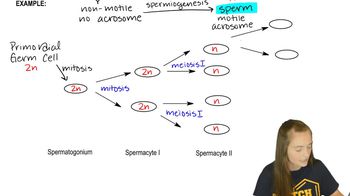Table of contents
- 1. Introduction to Genetics51m
- 2. Mendel's Laws of Inheritance3h 37m
- 3. Extensions to Mendelian Inheritance2h 41m
- 4. Genetic Mapping and Linkage2h 28m
- 5. Genetics of Bacteria and Viruses1h 21m
- 6. Chromosomal Variation1h 48m
- 7. DNA and Chromosome Structure56m
- 8. DNA Replication1h 10m
- 9. Mitosis and Meiosis1h 34m
- 10. Transcription1h 0m
- 11. Translation58m
- 12. Gene Regulation in Prokaryotes1h 19m
- 13. Gene Regulation in Eukaryotes44m
- 14. Genetic Control of Development44m
- 15. Genomes and Genomics1h 50m
- 16. Transposable Elements47m
- 17. Mutation, Repair, and Recombination1h 6m
- 18. Molecular Genetic Tools19m
- 19. Cancer Genetics29m
- 20. Quantitative Genetics1h 26m
- 21. Population Genetics50m
- 22. Evolutionary Genetics29m
9. Mitosis and Meiosis
Development of Animal Gametes
Problem 18
Textbook Question
Which of the following does not describe a homologous chromosome?
 Verified step by step guidance
Verified step by step guidance1
Understand the definition of homologous chromosomes: Homologous chromosomes are pairs of chromosomes in a diploid organism which have the same structural features and gene sequence. They pair up during meiosis and are inherited from each parent.
Identify key characteristics of homologous chromosomes: They have genes for the same traits at the same loci, are similar in size and shape, and pair during meiosis.
Analyze the options given in the question to see which one does not match the characteristics of homologous chromosomes.
Consider any option that suggests the chromosomes do not pair during meiosis, have different gene sequences, or are not inherited one each from both parents.
Eliminate the options that correctly describe homologous chromosomes and select the one that does not fit the definition or characteristics.
Was this helpful?

 21:21m
21:21mWatch next
Master Gamete Development with a bite sized video explanation from Kylia Goodner
Start learningRelated Videos
Related Practice


